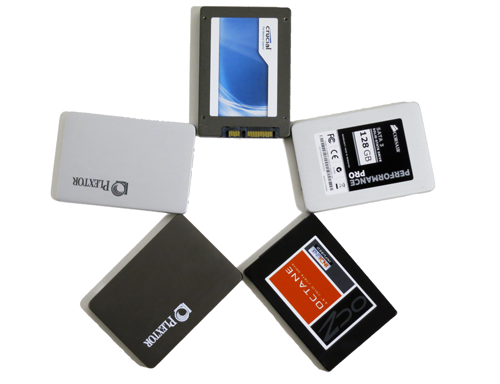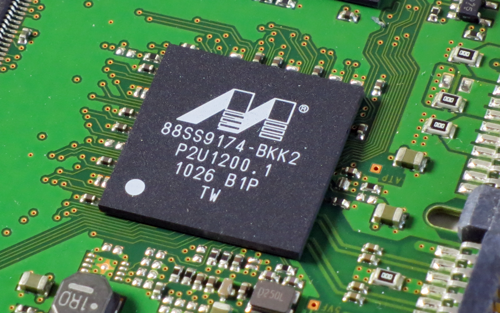Marvell-Based SSDs From Corsair, Crucial, OCZ, And Plextor: Tested
Differentiating With Marvell's SSD Controllers
Aside from Intel and Samsung, most SSD vendors employ storage controllers from either Marvell or SandForce. Developing the logic necessary to drive a solid-state drive at high performance in all relevant workloads without compromising data integrity is not an easy task, and buying the hardware directly from Marvell or SandForce lets new players participate in the market with a much smaller investment and compete aggressively.
Adopting a turnkey solution also makes it a lot more difficult to stand apart, though. As we found in Ten 60 GB SandForce-Based Boot Drives, Rounded-Up, there are a number of brands selling comparable SSDs, but most of them perform pretty much identically.
Unlike SandForce, Marvell gives its partners the option to license its controller firmware framework, which then gives vendors the option to lean on Marvell's reference design or optimize, facilitating differentiated solutions. OCZ seems to have taken that flexibility to an extreme in its Vertex 4, which operates at higher frequencies than Marvell's design and purportedly employs a heavily-modified firmware. You can read more about that particular implementation in OCZ Vertex 4 Review: A Flagship SSD Powered By...Indilinx?.
Of course, getting more heavily involved in modification means we're no longer talking about turnkey SSDs that perform similarly. Yay. That should make for a more interesting session of benchmarking, at least. Considerable development resources must be devoted to fully validating drive performance and endurance, creating unique or compelling features, and establishing the differentiation needed to make an SSD stand out from the rest of the pack.
Requiring that extra effort probably helps explain why there are fewer Marvell-based SSDs than there are from SandForce. And now that the SSD 510 is no longer with us (Intel SSD 510-Series 250 GB Review: Adopting 6 Gb/s SATA), making room for the newer SSD 520 (Intel SSD 520 Review: Taking Back The High-End With SandForce), we can no longer count Intel as a member of that fairly exclusive group of contenders.
Among the remaining guard, we have Corsair, Crucial, Plextor, and of course, OCZ.
We rounded up several Marvell-based SSDs to (hopefully) divulge how they differ. We're throwing in a SandForce-based OCZ Vertex 3 120 GB for comparison, too. The round-up is limited to 64 GB and 128 GB drives, two of the most popular capacities. Hopefully, our results help guide you in the direction of the most cost-effective Marvell-based SSD for your PC.
Get Tom's Hardware's best news and in-depth reviews, straight to your inbox.
On deck, we have:
- Corsair Performance Pro 128 GB (CSSD-P128GBP-BK)
- Crucial m4 64 GB (CT064M4SSD2)
- Crucial m4 128 GB CT128M4SSD2)
- OCZ Octane 128 GB (OCT1-25SAT3-128G)
- Plextor M3 64 GB (PX-64M3)
- Plextor M3 128 GB (PX-128M3)
- Plextor M3 Pro 128 GB (PX-128M3P)
Beyond modifications to the way the controller logic operates and firmware-based optimizations, vendors are also able to differentiate their drives through the use of three memory interfaces. We've talked about this in the past; however, leaning on Toggle-mode, synchronous ONFi, and asynchronous ONFi flash affects performance (and pricing) in a number of ways. To be sure, we'll be keeping an eye out for that.
Corsair and Plextor position their SSDs to attract enthusiasts willing to spend a little more, justifying their use of Toggle-mode NAND. Meanwhile, Crucial and OCZ both lean on familiar Synchronous ONFi flash from IM Flash Technologies.
| Toggle-Mode-Based | Synchronous-Based |
|---|---|
| Corsair Performance Pro 128 GB | Crucial m4 64 GB |
| Plextor M3 64 GB | Crucial m4 128 GB |
| Plextor M3 128 GB | OCZ Octane 128 GB |
| Plextor M3 Pro 128 GB | Row 3 - Cell 1 |
Current page: Differentiating With Marvell's SSD Controllers
Next Page Test Setup And Firmware Notes-
uruquiora hellfire24crucial FTW!hmm , my M4 has 10x more BSOD than my vertex 3... Each i boot my pc and work with it i prepare myself for a BSOD with my M4...Reply -
joytech22 uruquiorahmm , my M4 has 10x more BSOD than my vertex 3... Each i boot my pc and work with it i prepare myself for a BSOD with my M4...Reply
That is what we in the I.T industry like to call: "Faulty Hardware".
If you considered that normal all this time, I have some bad news for you..
-
chesteracorgi With the price of SSDs coming down, Toms should start introducing 256 GB + drives into its reviews. It's nice to have the 64 & 128 GB reviews, but for power builders the 256 GB is becoming mainstream.Reply -
Cyclops21 Any tests planned on the Sandisk Extreme models. They were a Tom's recommend buy but I still haven't seen any benchmarks on Tom's.Reply -
cknobman I'd still say for most boot and program drives SandForce is the way to go as it has a significant performance edge.Reply -
Onus I've only installed 6-7 SSDs, with mixed results. Two with Sadforce controllers died within months or weeks (the RMA of one is yet to be tested). Given that the slowest SSD beats the pants off the fastest magnetic HDD, I have quickly reached the conclusion that reliability has to be the #1 criterion for SSDs, and I'm not sure Sandforce is there yet.Reply
-
ramon zarat uruquiorahmm , my M4 has 10x more BSOD than my vertex 3... Each i boot my pc and work with it i prepare myself for a BSOD with my M4...Reply
You must be joking... The list of forum thread complaining about SF controller instability is endless. The M4 actually has a very solid reputation. I've been running 2 128GB M4 in 2 different PC for the last 8 months. Not a single BSOD. They still both benchmark the same speed as day 1. Actually, the M4 was and might very well still be the best choice for balance between price, performance and reliability in the whole SSD market. In my book, there are only 3 manufacturers really worth mentioning when it comes to SSD: Crucial, Intel and Samsung.
Your unit is simply defective. That can happen to any manufacturer. RMA it and be happy.

